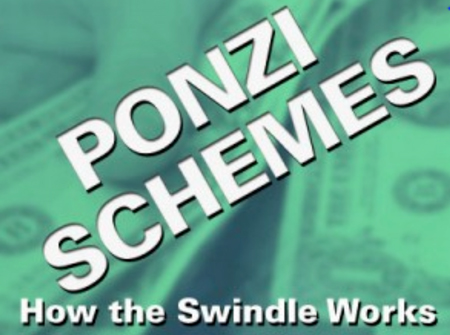 In the past I was fortunate enough to investigate many fraud schemes including a number of investment Ponzi schemes, including: clothing and apparel, foreign currency exchange, promissory notes, oil and gas royalty limited partnerships, and real estate limited partnerships. For me it was stimulating and fun— similar to putting together a large puzzle of evidence in order to bring individuals to justice.
In the past I was fortunate enough to investigate many fraud schemes including a number of investment Ponzi schemes, including: clothing and apparel, foreign currency exchange, promissory notes, oil and gas royalty limited partnerships, and real estate limited partnerships. For me it was stimulating and fun— similar to putting together a large puzzle of evidence in order to bring individuals to justice.
I recently read the book 65 billion reasons why you cannot trust Wall Street by Michael T. De Vita concerning his life experience with Bernard L. Madoff Investment Securities (BLMIS). In my experience Ponzi schemes, no matter how labeled, contain the same general characteristics.
Case Scenario:
The Madoff Ponzi scheme was in existence in 1996 and had similar general characteristics as the Austin Forex International Inc. (AFI) Ponzi scheme orchestrated by President and CEO Russell. He took in $40 million from 700 investors in Central Texas, while less than Madoff’s $65 billion received from tens of thousands of investors, it was significant in Austin, Texas.
The characteristics of the AFI Ponzi were the same as BLMIS:
- The artifice was foreign currency trading.
- The inducement was generated from a charismatic ex-football player using a slick brochure touting his football abilities at the University of Texas and the National Football League. The brochure included his work ethic, focus on clients, and ability to perform under pressure.
- AFI had an advanced information systems and proprietary software to monitor market issues, news, execute trades rapidly, generate accurate reports, and render bi-weekly client statements.
- The promotion was through a sales force that was paid large commissions for bringing in investors. In addition, he established a broker dealer operation that did not get off the ground.
- The capital needed to make the operation flourish was “other people’s money” (OPM) that was assisted by a change in Texas law that allowed individuals to borrow the equity in their homes.
- The scheme also used the services of intermediary companies that managed self-directed IRAs to be invested in the scheme.
- Early investors received returns on their investment exceeding the amount of their investment and were later pursued by the court appointed receiver for restitution.
- The reporting device was a fake bi-weekly investment statement for each client reflecting foreign currency trades. The fraudulent method was to report the same successful trade on each client statement creating a false positive impression of the health of the account.
- In their exuberance investors started to live off the earnings, purchase new homes, cars, and take vacations.
- The main trading platform was software written and maintained by Russians. They created the market for trades through their software that fraudulently imitated currency trades. We were able to trace $24 million of investor funds to Latvia before it disappeared.
- The actual investor funds were used to pay AFI operations, payroll, other investor redemptions, sales staff, and for personal use by the President and CEO to buy assets and pay liabilities. Unfortunately, investments in foreign currency can generate storage fees if positions are held overnight. AFI held positions overnight and paid storage fees that were never reported to clients.
- AFI like Madoff had no underlying economic means to generate the profits being distributed to the investors and after one and one-half years AFI ran out of investors and OPM. The State Securities Board began to receive complaints and began an investigation that lead to the demise of one of Austin’s largest Ponzi schemes.
It’s critical to protect your clients from such devastation, including the depletion of their retirement funds and/or personal capital. Ponzi schemes still exist today and have just not been exposed. Here’s how you can help prevent your client from falling victim to fraud:
- Understand the investment strategy and business model.
- Be skeptical of any oral representation by a promoter. (Take notes)
- Ignore the charm and charisma of the promoter. Don’t be flattered by being part of privileged group of prospective investors.
- Ignore the location where the solicitation takes place. (Fine steak and seafood restaurant)
- Get copies of the promoter’s written marketing material for further review.
- Ask question and take notes. Do not be afraid to appear dumb about the investment scheme.
- Remember that the promoter talking to you works on a commission and only cares about your money.
- Do not agree to make an investment or give a check to the promoter at the time.
- Determine the name of the top executives in the investment.
- Contact the State Securities Board and determine if they have anything on the top executive. Fraudsters are not embarrassed about being repeat offenders.
- Determine if the investment is registered with the State Securities Board.
- Determine if the promoter and the top executives are registered to sell securities in the state.
- Before giving your money to anyone get the investment package to review and read it entirely. It may be boring—but you should review it fully and look for contradictions with a critical eye.
- Understand that the old adage, “If it is too good to be true it generally is:” applies now in a post BLMIS time. Baby boomers are the targets of many fraudsters because they have built savings nest eggs.
- Consider having a consultant or private investigator prepare a background on the promoter, top management, and the entity. A little money spent will be well worth it if a fraud scheme is confronting you.
- Consider having an experienced securities lawyer review the prospect before making a decision.
It is difficult for an investor to see the internal operations of a Ponzi scheme but the characteristics of a Ponzi scheme are the same. Protect yourself and your client’s money by allowing a consultant and or private investigator of Sage Investigations, LLC assist you or your attorney with your investment decisions or to recover your money if you have made a bad investment. Please contact Sage Investigations, LLC and Chief Investigator, Edmond Martin at 512-659-3179. Let our 26+ years as an IRS Special Agent, former IRS agents, and CPAs guide you and your client.


 Call
Call